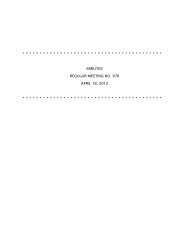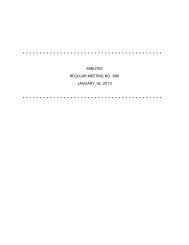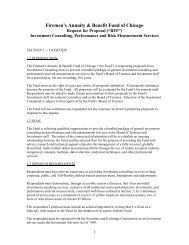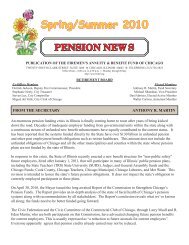Summer 2012 - Fabf.org
Summer 2012 - Fabf.org
Summer 2012 - Fabf.org
You also want an ePaper? Increase the reach of your titles
YUMPU automatically turns print PDFs into web optimized ePapers that Google loves.
MY TAKE ON DISABILITIES MICHAEL J. SHANAHAN, ACTIVE TRUSTEE<br />
As our members are aware, the Chicago Sun Times has been writing about what they believe are abuses within the<br />
Disability programs of both the Chicago Fire Department and the Chicago Police Department. In recent articles, the<br />
prominent suggestion appears to be that disabled members in question were working outside jobs while receiving<br />
disability benefi ts from the respective Funds.<br />
As it stands, there are no current statutory restrictions that prohibit recipients of disability from the Chicago Police and<br />
Fire Funds from having other outside employment. It is my belief that the Illinois State legislature specifi cally understood<br />
the nature of Public Safety and the risks associated with it. They did not think it necessary to penalize our members who<br />
are physically prevented from continuing their dangerous heavy level positions, from doing other things.<br />
As current President of the Firemen’s Annuity and Benefi t Fund of Chicago, I will not comment on anything concerning<br />
the Police Department or its members in receipt of disability. I can tell you that the Fire Fund will hold a hearing to<br />
terminate benefi ts if a disability recipient’s activities refute their own testimony. I can also tell you what I see about Fire<br />
Department disabilities. The following information was provided to the Sun Times and they may still see fi t to print it.<br />
• The Retirement Board (“Board”) of the Firemen’s Annuity and Benefi t Fund of Chicago (“Fund”) currently has<br />
380 members on disability; 252 duty, 124 occupational disease, 4 ordinary. This totals approximately 7 ½ % of<br />
the total current active Chicago Fire Department Population.<br />
• At 7 ½ %, the Fund’s roster of disability recipients as a percentage of active membership, is considerably<br />
lower than that of other major municipalities; New York is approximately 79%, Boston, at between 50% and<br />
60%, Houston is approximately 10%, Los Angeles is 16.6% (fi re & police combined)<br />
• The Board is responsible to oversee the process of disability application, review and hearings in accordance with<br />
the provisions of 40 ILCS, Act 5, Article 6 et. Seq. As such, in June 2000, the Board adopted procedural rules<br />
governing the application for and administrative hearings for duty, occupational disease and ordinary disability.<br />
Every disability hearing proceeds according to the format of these rules and the Board votes to grant or deny a<br />
member’s application solely upon the manifest weight of evidence presented as part of each application.<br />
• In the 10 years from 2003 through May <strong>2012</strong>, a total of 443 applications for disability were received and<br />
presented for hearing before the Board. 72 (16 ½ %) of these applications were denied by the Board. 57 of these<br />
denials were sustained, 10 of these decisions were overturned on appeal and 5 remain pending on appeal.<br />
• In accordance with Chicago Fire Department policy, if a member is not 100% fi t for active duty, they will not<br />
return them to active duty. In the same time period 2003 through May <strong>2012</strong>, 8 members were removed from<br />
the disability roster based on evidence that the disability had ceased. The fi re department then considered them<br />
for return to active duty. 17 of 72 other disability applicants that were denied disability benefi ts were returned to<br />
active duty.<br />
• During the application process, it is the participant’s Burden of Proof to prove that he/she is disabled for either<br />
of the benefi ts available. Once disability is granted, it becomes the Board’s Burden of Proof that the member is<br />
no longer disabled and is capable to return to duty. It is substantially more diffi cult for a disabled member to<br />
return to duty than it ever was for that same member to obtain his position as a new candidate. Returning<br />
a disabled member to active duty requires an examination and concurrence of that member’s capabilities by<br />
several treating or consulting physicians. Upon removal from the disability roster, it then becomes the member’s<br />
Burden of Proof to prove to the Chicago Fire Department that they are no longer disabled and are capable of<br />
performing the essential functions of the job. The Board has absolutely no authority to require any disabled<br />
member to accept treatment or undergo any procedure that could potentially hasten their return to active duty.<br />
The Board has attempted to introduce legislative amendments to provide limited authority in this matter without<br />
success.<br />
• The Chicago Fire Department does not have light duty for any member that is less than 100% capable of<br />
performing full duties, which are rated at the very heavy level by the Department of Labor and OSHA.<br />
10
















